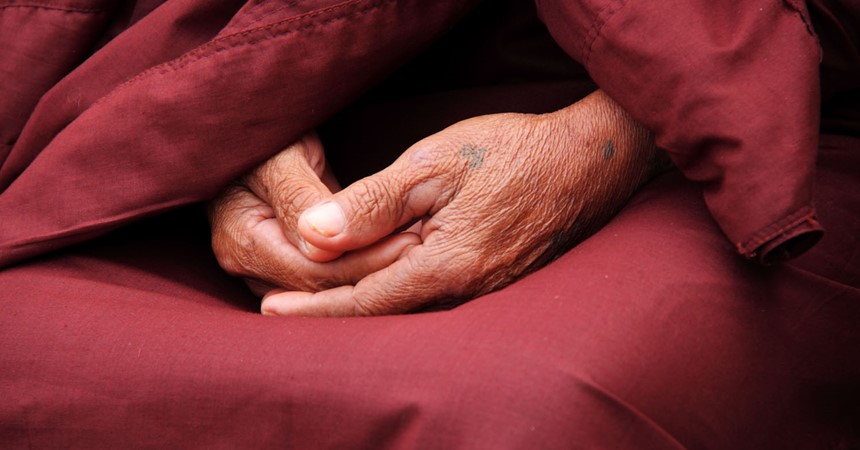What is Buddhism?
“Buddhism is the practice of Buddha’s teachings, also called ‘Dharma’, which means ‘protection’. By practising Buddha’s teachings, living beings are permanently protected from suffering. The founder of Buddhism is Buddha Shakyamuni, who showed the manner of accomplishing the ultimate goal of living beings, the attainment of enlightenment, at Bodh Gaya in India in BC589.” Modern Buddhism (2nd edition, 2014, page 3)
What did Buddha teach?
Buddha taught that all living beings, including animals and insects, share the same basic wish, to be happy and to be free from suffering. We have had this wish our whole lives, and if we check carefully we will see how it underpins all that we think, say and do, from having a cup of coffee, to buying the weekly lotto ticket or avoiding that annoying person at work!
We wish to draw close to, and never be separated from, the people, situations and things that make us feel comfortable, happy and secure. We try also to avoid the people, situations and things that make us uncomfortable, anxious or unhappy.
We tend to believe that things such as food, money, reputation, relationships, status and material possessions are real causes of happiness and, motivated by this wish, we devote much time and energy to gathering and increasing these things and guarding against their loss. We easily become attached and emotionally dependent on them; as a result, we find it difficult to be happy without them. We are always thinking “I’ll be happy when or I was happy when……” indicating we’re not as happy as we would like to be right now. “I’ll be happy when I go home, I’ll be happy when I retire…”
Because we rely so heavily on conditions outside our control, our experience of happiness and quality of life is as vulnerable as a child’s sandcastle at the beach. As Geshe Kelsang says in How to Transform Your Life (2nd edition, 2016 page 278), “We are like a child making a sandcastle who is excited when it is first made, but who becomes upset when it is destroyed by the incoming tide. By training in meditation, we create an inner space and clarity that enable us to control our minds regardless of external circumstances. Gradually we develop mental equilibrium, a balanced mind that is happy all the time, rather than an unbalanced mind that oscillates between the extremes of excitement and despondency.”
Real happiness is not to be found outside the mind. Happiness is a feeling which is a part of our mind and so its main cause must lie within the mind itself.
The main cause of happiness is inner peace. The more peaceful our mind is, the happier we are. If our mind is peaceful, we are happy, if it is un-peaceful, we are unhappy. Inner peace is real enjoyment. Without a peaceful mind it’s impossible to enjoy anything. For example, we might be enjoying a walk by the beach then we remember a problem at work, a person we dislike, or maybe an unresolved issue from 20 years ago! If our mind responds in a negative way, such as with anger or jealousy, then whatever peace of mind we enjoyed a moment ago is destroyed. The walk, the beach, the person we’re with at the time, have no power to bring that enjoyment back. And to think that only an hour before we were thinking, “I’ll be happy when I go for walk…by the beach…with my friend...”
If something is a true cause of happiness, the more you have of it, the happier you become. Even our favourite food, music or other ordinary enjoyment is not real happiness. After a while we seek a change of song, menu or even partner! The development of inner peace, however, is non-deceptive. As mentioned above, the more peaceful our mind is, the happier and more content we are. We’ll never get to a point where we think, “I’m too peaceful!”
Buddha said, “If you realise your own mind, you will become a Buddha. You should not seek Buddhahood elsewhere.”
We all have the potential to become a Buddha or “enlightened being”. As Geshe Keslang Gyatso says in The New Eight Steps to Happiness (2nd edition, 2015 page 81). “In the heart of the cruellest and most degenerate person exists the potential for limitless love, compassion and wisdom. Unlike the seeds of delusions, which can be destroyed, this potential is utterly indestructible, and is the pure, essential nature of every living being.”
Virtuous states of mind such as faith, love, compassion and wisdom are real causes of inner peace. For example, when we genuinely love someone, our mind is peaceful and therefore happy! The opposite is true for negative states of mind such as hatred. “From virtuous actions comes happiness. From non-virtuous actions comes suffering. If we believe in this, we believe in Karma.” Modern Buddhism (2nd edition, 2014 page 42).
Buddha explained how all suffering can be traced back to selfish intention and ignorance, and all the happiness in the world arises from cherishing others and wisdom.
Buddhists talk about ‘Samsara’ and ‘Nirvana’. Samsara is the personal reality created by a deluded mind and Nirvana is the experience of a mind free from delusion. The sublime inner peace of nirvana and all the elaborate sufferings of samsara depend upon the mind. According to Buddhism, mind is the creator of all. There is no objective reality, everything depends on the mind and our previous actions (karma). This is why everyone has a unique experience and no two people are identical.
Mind also is without beginning or end, and because our bodies are impermanent, it follows we have had countless previous lives. Each life is like a new dream − sometimes pleasant, sometimes unpleasant − but all are equally a mere appearance in the mind, just like a dream.
A Buddha is said to be an “awakened one”, a person who has awoken from the sleep of the delusions and sees things as they really are. The Buddhist path to nirvana is therefore a path of spiritual awakening, transcending the painful minds that create suffering and instead becoming completely familiar with the causes of peace until the experience of peace and happiness becomes unchanging. How wonderful!
Buddhist principles and meditations are not just for ‘Buddhists’, Buddhist teachings can be practised by anyone. All that’s required is a wish to find real inner peace!
Please visit Meditate in Newcastle.




























































































